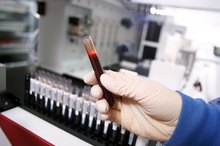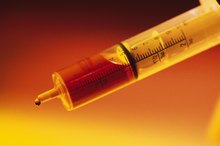What does fact checked mean?
At Healthfully, we strive to deliver objective content that is accurate and up-to-date. Our team periodically reviews articles in order to ensure content quality. The sources cited below consist of evidence from peer-reviewed journals, prominent medical organizations, academic associations, and government data.
- “Indian Journal of Nephrology”; Spectrum of Childhood Nephrotic Syndrome in Iran: A Single Center Study; A. Safaei, S. Maleknejad; July 2009
- “Indian Journal of Nephrology”; Spectrum of Childhood Nephrotic Syndrome in Iran: A Single Center Study; A. Safaei, S. Maleknejad; July 2009
- “European Journal of Pediatrics”; Clinical Practice. Protein-Losing Enteropathy in Children; M.J. Braamskamp, et al.; October 2010
- “European Journal of Pediatrics”; Clinical Practice. Protein-Losing Enteropathy in Children; M.J. Braamskamp, et al.; October 2010
The information contained on this site is for informational purposes only, and should not be used as a substitute for the advice of a professional health care provider. Please check with the appropriate physician regarding health questions and concerns. Although we strive to deliver accurate and up-to-date information, no guarantee to that effect is made.
Why Are My Total Protein Levels Low?
Proteins serve a variety of functions in your body, and many of them are normally found in your bloodstream, where they can be measured to help determine your general level of nutrition or to check for certain disease states. Some disorders, such as multiple myeloma, increase your total protein level, while others, such as liver failure, lower it. A low total serum protein level can result from deficits in one specific protein or class of proteins or from a generalized suppression of several proteins.
Sources
The majority of proteins found in your serum are manufactured in your liver. Gamma-globulins, also known as immunoglobulins, are produced by specialized white blood cells called B lymphocytes. Some proteins, such as hemoglobin and lipoproteins, are also transported through your bloodstream, but they are not counted as part of your total protein level.
Malnutrition
What Does High Protein in Your Blood Mean?
Learn More
Since the proteins in your bloodstream are all constructed from amino acids, a deficiency of these essential building blocks can produce a generalized decrease in protein synthesis, which is reflected in a low total protein level. Protein-energy malnutrition is uncommon in developed countries, although it sometimes occurs in institutionalized patients or in certain medical conditions, such as cancer, advanced heart failure or AIDS. Because your body breaks down muscle and other available proteins to maintain serum protein concentrations, a low total protein level due to malnutrition frequently only occurs following prolonged starvation.
Liver Disease
If your liver’s ability to synthesize proteins is impaired, many of your serum proteins may decrease, leading to a low total protein level. The production of albumin -- the most abundant protein in your bloodstream -- often falls as a result of chronic liver disease, thereby causing your total protein level to decrease. Alcohol can contribute to low total protein levels even when overt liver disease is not present because it impairs your liver’s ability to manufacture albumin.
- If your liver’s ability to synthesize proteins is impaired, many of your serum proteins may decrease, leading to a low total protein level.
- The production of albumin -- the most abundant protein in your bloodstream -- often falls as a result of chronic liver disease, thereby causing your total protein level to decrease.
Gastrointestinal and Kidney Losses
What Are the Causes of Low Plasma Protein?
Learn More
Because:
- of their small size
- some proteins can pass through your kidneys
- mucous membranes relatively easily
- but larger proteins
- such as albumin
- are retained within your bloodstream under normal circumstances
The July 2009 issue of “Indian Journal of Nephrology” describes a relatively common condition called nephrotic syndrome, which is characterized by kidney damage leading to massive loss of albumin with resultant low serum protein levels 2. Similarly, any condition that increases the “leakiness” of your intestine -- inflammatory bowel disease, multiple polyps, intestinal surgery or infections -- can lead to a loss of albumin, immunoglobulins or other proteins.
Considerations
Low total serum protein levels can result from poor nutrition, impaired liver function, kidney disease, gastrointestinal disorders, exposure to toxins or any other condition that impairs protein synthesis or increases protein losses. In some cases, you may have low protein levels simply on the basis of over-hydration, which dilutes the proteins in your bloodstream and leads to inaccurate laboratory interpretation of your blood test. If you are in good health, a repeat measurement is reasonable. If your low protein level persists, ask your physician for a thorough evaluation to determine a cause.
- Low total serum protein levels can result from poor nutrition, impaired liver function, kidney disease, gastrointestinal disorders, exposure to toxins or any other condition that impairs protein synthesis or increases protein losses.
- In some cases, you may have low protein levels simply on the basis of over-hydration, which dilutes the proteins in your bloodstream and leads to inaccurate laboratory interpretation of your blood test.
Related Articles
References
- “The Merck Manual of Diagnosis and Therapy, 18th Edition”; Mark H. Beers, M.D., Editor-in-Chief; 2006
- “Indian Journal of Nephrology”; Spectrum of Childhood Nephrotic Syndrome in Iran: A Single Center Study; A. Safaei, S. Maleknejad; July 2009
- “European Journal of Pediatrics”; Clinical Practice. Protein-Losing Enteropathy in Children; M.J. Braamskamp, et al.; October 2010
Writer Bio
Stephen Christensen started writing health-related articles in 1976 and his work has appeared in diverse publications including professional journals, “Birds and Blooms” magazine, poetry anthologies and children's books. He received his medical degree from the University of Utah School of Medicine and completed a three-year residency in family medicine at McKay-Dee Hospital Center in Ogden, Utah.









